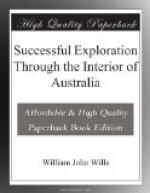rage, asking Mr. Burke whether he intended that I should
superintend him?” To talk, touch, or mention
anything about his favourites, the camels, was sure
to bring on “a scene.” “On his
remarking that there was no rope here, I mentioned
that we had just brought one across with us, when
he wanted to know what business I had to say anything.
Altogether, he made a great fool of himself before
several of the men, and a Mr. Wright, the manager of
the Kinchica Station.” These camels, under
Mr. Landells’ spoiling, appear to have become
the plague of the expedition. They were to have
rum—solely, as it now appears, because Mr.
Landells “knew of an officer who took two camels
through a two years’ campaign in Cabul, the
Punjab, and Scinde, by allowing them arrack.”
They were to carry more stores for themselves than
they were worth. They were not to make long journeys,
nor to travel in bad weather, nor to be subject to
any one’s direction, or opinion, or advice.
In fine, the chief difficulty of exploring Australia
seemed to consist in humouring the camels. We
may imagine the feelings of a leader with such a drag
as this encumbering him. Mr. Pickwick could never
have viewed with such disgust the horse which he was
obliged to lead about as Mr. Burke must have regarded
his camels. When to this it is added that the
leader observed various intrigues carried on, we cannot
wonder that he determined to come to an open rupture
before Mr. Landells and the camels had completely
disorganized the expedition. “Whereupon
it came out,” writes Mr. Wills, “that Mr.
Landells has been playing a fine game, trying to set
us all together by the ears. There is scarcely
a man in the party whom he has not urged Mr. Burke
to dismiss.” Under such a state of things,
the leader of the expedition must have been painfully
aware that his party was in no fit state of organization
to enter on a most perilous undertaking, and that
while such continued, both he and his men were going
to inevitable destruction. If his conduct appeared
to Mr. Landells restless and uncertain, we may wonder
how, under the circumstances, it could be otherwise.
We find it impossible to believe that the Exploring
Committee of the Royal Society could have secretly
informed Mr. Landells that he held independent command,
for such a thing would be a burlesque on discipline.
He claims the sole management of the camels; and perhaps
the committee may have defined his duty as such.
But so also has a private soldier the sole management
of his musket, but it is under the directions of his
officer. Profound as may be Mr. Landells’
knowledge of camels, it would be worse than useless
unless subject to the direction of his commanding officer.
. . .




